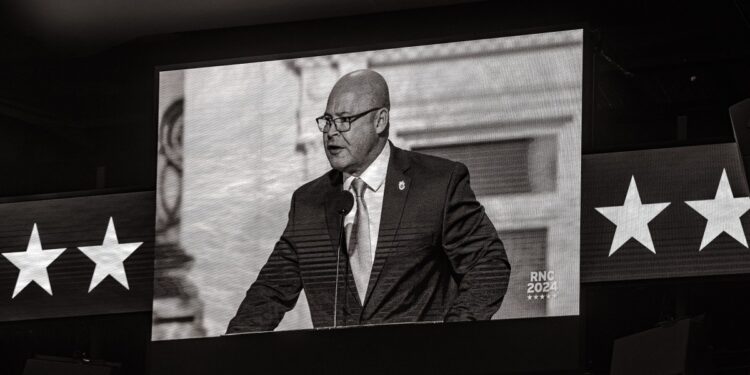The Teamsters union has decided not to endorse a candidate in the 2024 presidential election—reflecting a growing political rift within one of the country’s most powerful labor organizations and delivering Trump a political victory.
The union announced its decision on Wednesday afternoon, shortly after releasing the results of a poll conducted of members after both parties’ conventions. Almost 60 percent of members supported Donald Trump while 34 percent supported Kamala Harris. (A sample size was not provided.) The results show a significant shift from the union’s straw polling earlier this summer, completed prior to President Joe Biden’s announcement that he would not seek reelection, in which 44 percent supported Biden and 36 percent supported Trump.
“The union was left with few commitments on top Teamsters issues from either former President Donald Trump or Vice President Kamala Harris—and found no definitive support among members for either party’s nominee,” the Teamsters union said in a press release.
With 1.3 million members, the Teamsters are one of largest unions in the United States, and they have supported Democrats in the recent past—endorsing against Trump twice. But the union also has a history of being out-of-step with the labor movement’s embrace of Democrats: they were the only major union to back Ronald Reagan in 1980 and 1984, and George H.W. Bush in 1988.
The Teamsters are an outlier among other influential labor unions, who have largely rallied behind Harris. The UAW, AFL-CIO, and NEA all endorsed Harris shortly after she stepped up as the Democratic nominee.
Trump was quick to claim the poll results as a win. His campaign wrote in a press release that the “vast majority of rank-and-file working men and women in this important organization want President Donald Trump back in the White House.”
Labor unions are no longer the “behemoth” political forces they were in the 20th century, said David Macdonald, a political science professor at University of Florida. Still, their endorsement in the presidential race can influence undecided members in key swing states.
Teamster president O’Brien had spent several months courting Trump despite the former president’s staunch anti-labor record, a decision which drew public outcry from some members, including vice president at-large John Palmer. O’Brien spoke at the Republican National Convention in July, praising Trump’s “backbone.” Though O’Brien said that he had requested a speaking slot at the Democratic National Convention, he was conspicuously absent from the podium.
Harris met with union leaders on Monday, an encounter which the New York Times reported was “sometimes tense.” Palmer told the Times that the vice president said, “I want your endorsement, but if I don’t get it, I will treat you exactly as if I had gotten your endorsement.”







